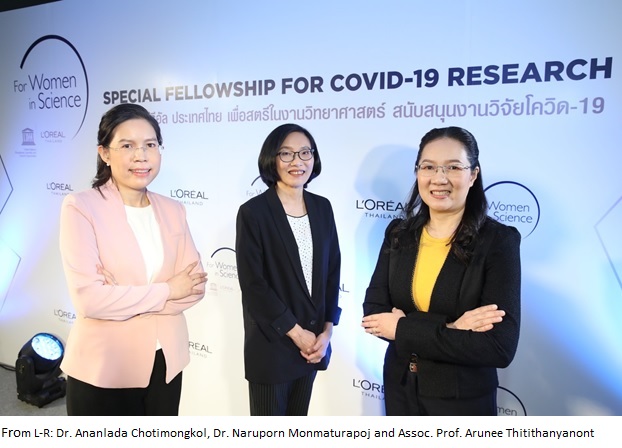Two of NSTDA’s female researchers were among recipients awarded L’Oréal Thailand COVID-19 Solidarity prizes announced on 11 June 2020. Set up specially to support young talents to develop research and innovation to fight the COVID-19 crisis, the prizes were part of L'Oréal-UNESCO For Women in Science Awards and recognized three Thai researchers, namely Assoc. Prof. Arunee Thitithanyanont, M.D. (Faculty of Science, Mahidol University), Dr. Naruporn Monmaturapoj (Assistive Technology and Medical Devices Center, NSTDA), and Dr. Ananlada Chotimongkol (Assistive Technology and Medical Devices Center, NSTDA). Each awardee receives a 250,000 THB research fund.

Assoc. Prof. Arunee Thitithanyanont, M.D. received her award in the field of life sciences to develop COVID-19 diagnosis, treatment and vaccine as well as investigate genetic mutation and epidemiology of SARS-CoV-2. She has been working with several research teams on a number of projects addressing COVID-19 pandemic, including an isolation of SARS-CoV-2 from Thai patients at the early stage of the outbreak, the development of a diagnostic method, and the development of a drug screening platform for COVID-19.
With her expertise in material science, Dr. Naruporn Monmaturapoj will use the fund to advance her project to manufacture innovative face masks that offer enhanced protection against virus particles and PM2.5. The 3-D masks are four-ply (4 layers) and coated with hydroxyapatite-titanium dioxide composites. Hydroxyapatite has a property to attract virus and bacteria to the outer surface of the masks whereas titanium dioxide deactivates microorganisms via photocatalytic oxidation. This mask provides 99% protection from PM2.5 - according to ASTM F2299 standard - and 99% viral filtration efficiency - according to ASTM F2100 standard. The ability to manufacture the masks locally will reduce the importation of such product and provide health security to Thai people.
Dr. Ananlada Chotimongkol received the award in the field of technology. She has developed a system called DDC-Care that enables the Department of Disease Control (DDC) to monitor and assess health of people at risk of contracting COVID-19 who undergo 14-day self-isolation. The system has three components, namely a website for user to register, a mobile application to which users can self-report their health information, receive notification and advice from DDC and allow DDC to access users’ location in case medical assistance needs to be dispatch, and a dashboard for DDC to monitor the overall COVID-19 situation in Thailand in real time. The system was first used by Bamrasnaradura Infectious Diseases Institute and has now expanded to 51 hospitals and health centers, as well as 18 provincial and district health offices.
